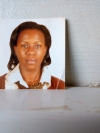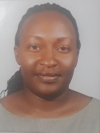David Wells Arthur
ID:
|
How the relatedness information encoded in scent changes with age in wild banded mongooses
REFNo: NS69ES
Determine how relatedness information is communicated and understand why synchronised births are sufficient to prevent infanticide.
Determine if juveniles encode the same relatedness information in scent that adults do.
|
UK |
2018-12-20 |
2021-12-20 |
Natural Sciences |
|
Degree Award |

|
Joseph Akuze
ID:
|
An Algorithm to Predict Newborn Complications in the First 28 days of Life at Iganga General and Jinja Regional Referral Hospital (N-COP Study)
REFNo: HS256ES
General Objective
The purpose of this study is to develop – an algorithm to predict newborn complications in order to improve management and care among newborns.
Specific Objectives
1.To develop an algorithm to predict newborn complications in the first 28 days of life stratified by gestation age at birth.
2.To determine the incidence of newborn complications within the first 28 days of life: -stratified by gestational age at birth.
3.To establish the time to newborn complications within the first 28 days stratified by gestational age at birth.
4.To estimate time to newborn complications and mortality within the first 28 days of life.
|
Uganda |
2018-12-20 |
2021-12-20 |
Medical and Health Sciences |
|
Non-degree Award |

|
Julia Downing
ID:
|
Impact of the Ugandan Palliative Care Nurse Leadership Project
REFNo: HS274ES
The study is aimed at assessing the impact of the original Ugandan Palliative Care Nurse Leadership Programme
|
UK |
2018-12-20 |
2021-12-20 |
Medical and Health Sciences |
|
Non-degree Award |

|
Jane Francis Namukasa Wanyama
ID:
|
Antiretroviral therapy outcomes, barriers and facilitators of linkage into care and adherence among individuals initiating treatment under “Test and Start†guidelines in urban HIV clinics in Uganda
REFNo: HS281ES
General Objective: To establish treatment outcomes, barriers and facilitators of adherence and linkage to care among individuals initiating ART under “Test and Start†guidelines in six urban HIV clinics in Uganda.
Specific objectives: The study has three specific objectives:
Specific objective 1: To describe treatment outcomes among HIV positive individuals initiated on ART under “Test and Start†guidelines over a 2-year period.
This will be a retrospective evaluation of prospectively collected data of all HIV positive individuals who were initiated on ART under “Test and Start†guidelines at Kisenyi, Kisugu, Kawaala, Komamboga and Kiswa HC III. Our extracted dataset will include all eligible ART patients who started ART between January 2017 and January 2018. Follow up period for each participant will be two years until January 2020. We shall describe the proportion of participants achieving virological suppression, incidence of OIs, retention rates, mortality rates and adherence patterns for patients retained on ART at 6,12 and 24months.
Specific Objective 2: To explore barriers and facilitators for linkage into care following HIV diagnosis under “Test and Start†guidelines.
This will be a qualitative study in which a purposively selected sample of individuals who tested HIV positive but were not linked into care or those who were linked into care but declined to initiate ART will participate in In-depth interviews (IDIs). We shall also conduct IDIs to explore facilitators and barriers for linkage into care among those who were linked into care at any of the five Health Center(HC) IIIs following HIV diagnosis.
Specific Objective 3: To explore barriers and facilitators for adherence to ART among individuals initiated on ART under the “Test and Start†guidelines.
This will be a qualitative study in which a purposively selected sample of individuals initiated on ART under “Test and Start†guidelines will participate in IDIs. Adherence scores will be extracted from the ART clinic databases as assessed by the health care providers. We shall explore facilitators for ART adherence among adherers (reporting adherence ≥95%) with corresponding viral suppression as a proxy marker for adherence. To explore barriers for adherence, participants with poor adherence will be categorized as irregular (inconsistent) and lost to follow up (LTFU). Both adherers and non-adherers will be stratified by gender, marital status, employment status and age.
Additionally, Key Informant Interviews (KIIs) will be conducted with healthcare providers to assess their experiences regarding barriers and facilitators for ART adherence among patients initiated on ART under “Test and Start†guidelines.
|
Uganda |
2018-12-20 |
2021-12-20 |
Medical and Health Sciences |
|
Non-degree Award |

|
Anthony Fuller
ID:
|
A Community-Based Cross-sectional Study of Epilepsy Prevalence and Barriers to Epilepsy Treatment in Uganda
REFNo: HS291ES
Main objective: The first objective of this study is to estimate the countrywide prevalence of epilepsy in Uganda. The second objective is to characterize the community-held beliefs and barriers affecting epilepsy treatment in Uganda.
Specific Objectives:
AIM 1: To estimate the countrywide prevalence of epilepsy in Uganda
1A- To describe geographic variation, if any, of epilepsy prevalence
AIM 2: To characterize the community-held beliefs about epilepsy in Uganda.
2A- To assess knowledge, attitudes, and other factors associated with epilepsy treatment barriers in Uganda.
|
USA |
2018-12-20 |
2021-12-20 |
Medical and Health Sciences |
|
Non-degree Award |

|
Daniel Kabugo
ID: UNCST-2019-R000502
|
Developing and assessing the feasibility, acceptability and scalability of a Hospital to Home Programme for high-risk newborns discharged from the Kiwoko Hospital neonatal unit
REFNo: HS292ES
The primary aim of this study is to develop and pilot a discharge and follow-up programme for high-risk newborns discharged from the Kiwoko Hospital neonatal unit, and to examine its feasibility, acceptability and potential for impact on the health and wellbeing of the child and their caregivers.
|
Uganda |
2018-12-20 |
2021-12-20 |
Medical and Health Sciences |
|
Non-degree Award |

|
Joanna Hill
ID:
|
Understanding movement patterns and habitat use of crop raiding African elephants in Northern Murchison Falls Conservation Area, Uganda
REFNo: NS80ES
Objective 1: Create an elephant identification database
Objective 2: Determine range patterns and habitat use of elephants using GPS collars
Objective 3:Create human and elephant activity maps using satellite imagery
Objective 4: Design a package of conflict and poaching reduction measures
|
UK |
2018-12-20 |
2021-12-20 |
Natural Sciences |
|
Non-degree Award |

|
Adrienne Guignard
ID:
|
The semantics of the alarm calling system of wild blue monkeys
REFNo: NS67ES
Examine empirically if blue monkeys maximise informativity when producing vocalizations and interpret calls as a function of the meaning of other calls
|
Switzerland |
2018-12-19 |
2021-12-19 |
Natural Sciences |
|
Degree Award |
.jpg)
|
Andrew Mujugira
ID: UNCST-2019-R000871
|
HIV self-testing to increase testing of male partners in antenatal care in Uganda
REFNo: HS273ES
Primary objective: Determine whether secondary distribution of HIV self-testing to male partners of HIV-negative pregnant women increases the proportion of male partners who test for HIV compared to standard of care invitation letters for fast track testing.
Secondary objective: Evaluate whether HIV testing of male partners is associated with PrEP interest among HIV-negative women whose partner tests HIV-positive or
refuses testing.
|
Uganda |
2018-12-11 |
2021-12-11 |
Medical and Health Sciences |
|
Non-degree Award |

|
Christine Wiltshire Sekaggya
ID: UNCST-2019-R000578
|
A randomized, four-arm open label Phase IIb clinical trial to evaluate the Pharmacokinetics, Safety/tolerability and Efficacy of High Dose Rifampicin in TB-HIV co-infected patients on Efavirenz- or dolutegravir-based antiretroviral therapy (SAEFRIF)
REFNo: HS262ES
Primary objective
1. To determine the effect of a high dose of rifampicin (35 mg/kg orally) on the pharmacokinetics of first-line antiretroviral drugs (efavirenz and dolutegravir) in TB-HIV co-infected patients on TB treatment.
Secondary objectives
1. To investigate the safety/tolerability of a high dose of rifampicin in TB-HIV co-infected patients on TB treatment and first-line antiretroviral therapies.
2. To determine if TB-HIV co-infected patients on a high dose of rifampicin are more likely to have negative sputum cultures by the end of the intensive phase of TB treatment than patients on standard-dose rifampicin.
3. To explore the relationships between exposure to rifampicin, efavirenz and dolutegravir and the tolerability and efficacy of these drugs (Pharmacokinetic-Pharmacodynamic analysis).
|
Uganda |
2018-12-04 |
2021-12-04 |
Medical and Health Sciences |
|
Non-degree Award |
.png)
|
Nurait Nambogo
ID:
|
Mobile based application for appointment scheduling by health professionals
REFNo: HS251ES
•To assess the acceptability of MobiCare among health professionals and Patients/Clients.
•To pilot test MobiCare application at selected private health facilities in Mbarara municipality.
|
Uganda |
2018-12-04 |
2021-12-04 |
Medical and Health Sciences |
|
Non-degree Award |

|
Mohammed Lamorde
ID: UNCST-2019-R001293
|
Clinical Evaluation of the FilmArray Global Fever (GF) Panel
REFNo: HS265ES
To evaluate the clinical sensitivity and specificity of the assays comprising the FilmArray GF Panel when used to test whole blood specimens. It is hypothesized that the FilmArray GF Panel assays will detect clinically relevant levels of the pathogens included in the panel and give no false detections.
|
Nigeria |
2018-12-04 |
2021-12-04 |
Medical and Health Sciences |
|
Non-degree Award |

|
Gloria Kirungi Kasozi Kasozi
ID:
|
School-Based Sexual and Reproductive Health Services for Prevention of Adolescent Pregnancy in Hoima District, Uganda: a cluster randomized controlled trial
REFNo: HS247ES
1. To investigate the effect of School Based SRH services on occurrence of adolescent pregnancy among school girls aged 15-19 years in Hoima District, Uganda.
2. To evaluate the effect of School Based SRH services on sexual behavioral change for prevention of adolescent pregnancy among school girls aged 15-19 years in Hoima District, Uganda.
3. To analyze the effect of School Based SRH services on utilization of SRH services among school girls aged 15-19 years in Hoima District, Uganda.
4. To develop a School Based SRH services model for the prevention of adolescent pregnancy among school girls in Uganda
|
Uganda |
2018-11-30 |
2021-11-30 |
Medical and Health Sciences |
|
Degree Award |

|
BOSCO AGABA BEKIITA
ID: UNCST-2019-R000549
|
Molecular Epidemiological Surveillance of pfhrp2 and pfhrp3 Gene Deletions in Plasmodium falciparum Parasite Population in Uganda
REFNo: HS271ES
(i) To determine prevalence of pfhrp2/3 gene deletions in P. falciparum parasites in Uganda.
(ii) To determine the distribution and geographical spread of pfhrp2/pfhrp3 gene deletions in P. falciparum parasites in Uganda.
(iii) To determine the factors associated with pfhrp2/pfhrp3 gene deletions in P. falciparum parasites in Uganda.
(iv) To determine diagnostic accuracy of malaria RDTs as compared to blood smear microscopy and PCR in settings where there are pfhrp2/pfhrp3 gene deletions in Uganda.
(v) To determine the multiplicity of infections in P. falciparum strains with pfhrp2/ pfhrp3 gene deletions in Uganda.
(vi) To determine the genetic diversity of P. falciparum Histidine-Rich Protein-2/3 genes in Parasite populations in Uganda.
(vii) To determine the origin and relatedness of pfhrp2/pfhrp3 gene deleted P.falciparum strains in Uganda.
|
Uganda |
2018-11-30 |
2021-11-30 |
Medical and Health Sciences |
|
Degree Award |

|
Joseph Baluku B
ID: UNCST-2019-R000612
|
One Dollar Incentive to Improve Tuberculosis Treatment Outcomes in a Programmatic Setting (ODITOPS trial)
REFNo: HS254ES
Primary objectives:
1. To determine the effect of a one dollar incentive on the TB treatment success rate of patients receiving TB treatment in rural hospitals of Uganda and Kenya.
2. To determine the effect of a one dollar incentive on TB loss to follow up rate of patients receiving TB treatment at rural hospitals in Uganda and Kenya
Secondary Objectives:
1. To determine the effect of a one dollar incentive on TB death rate of TB patients receiving TB treatment at rural hospitals in Uganda and Kenya.
2. To evaluate the impact of a one dollar incentive on the TB treatment failure rate of TB patients receiving TB treatment at rural hospitals in Uganda and Kenya
|
Uganda |
2018-11-13 |
2021-11-13 |
Medical and Health Sciences |
|
Non-degree Award |

|
Hindum Lanyero
ID:
|
Monitoring antibacterial use in children under five in rural Communities of northern Uganda.
REFNo: HS235ES
General Objective
To investigate antibacterial use among children under five in rural communities of northern Uganda and develop a method that can be used to validate the reported use.
Specific objectives
1. To determine antibacterial medicine use patterns as reported by caregivers of children under five who present with symptoms of acute respiratory tract infections and/or diarrhea in rural communities of northern Uganda (sub-study I).
2. To develop a chromatographic method for simultaneous identification of multiple antibacterial medicines in whole blood and urine spotted on filter paper (Sub-study II).
3. To establish the validity of self-reports in monitoring antibacterial use in children under five who are brought to health facilities with symptoms of acute respiratory tract infections and/or diarrhea in rural communities of northern Uganda (sub-study III)
|
Uganda |
2018-11-06 |
2021-11-06 |
Medical and Health Sciences |
|
Degree Award |

|
Noeline Nakasujja
ID: UNCST-2019-R001428
|
Pictures of ageing in Uganda: A pilot study to explore demography, healthy ageing phenotype and self-perception in a community of older people in Uganda
REFNo: SS246ES
Primary objective:
To determine the feasibility of combining demographic, phenotypic and artistic methods in understanding the picture of Ageing of community dwelling elderly individuals in Uganda.
Secondary objectives:
1) To assess the accuracy of age-reporting among older people (>60 years) living in a Wakiso District community and investigate how the accuracy of age-reporting is linked to health, capabilities, social status and residential circumstances.
2) To pilot test data collection tool for demographic assessment of older people in Uganda (culturally, linguistically, historically appropriate).
3) To pilot test data collection tools for phenotypic assessment of older people in Uganda (health status, frailty, cognition, capabilities, quality of life, co-morbidities including HIV, access to health and other services).
4) To assess feasibility and acceptability of undertaking cognitive testing using electronic tablets in older people living in a Wakiso District community.
5) To assess feasibility and acceptability of engaging older people through visual / performing arts activities.
6) To explore perceptions and attitudes to a community based participatory research in older people building on discussions/ interviews conducted in the context of 1-4 above.
7) To develop an exhibition of artwork by established artists and older people to express their perceptions of older age.
|
Uganda |
2018-11-06 |
2021-11-06 |
Social Science and Humanities |
|
Non-degree Award |

|
Sarah Baliddawa
ID:
|
Household members’ role and experiences during MDR-TB patients care at Mbarara Regional Referral Hospital, Uganda
REFNo: HS253ES
General objective:
 To explore the roles and experiences of household members during the care of MDR-TB patients attending MRRH
Specific objectives:
 To explore household members’ definition of MDR-TB
 To explore the roles played by household members in care of MDR-TB patients
 To explore the experiences of household members during care of MDR-TB patients
|
Uganda |
2018-11-06 |
2021-11-06 |
Medical and Health Sciences |
|
Degree Award |

|
Nelson TING
ID:
|
Genetic identity of elephant migrants across a forest-savanna mosaic of protected areas in Western Uganda
REFNo: NS72ES
To generate baseline knowledge of elephant movement, habitat use, and population size in and among the forested protected areas of western Uganda.
|
USA |
2018-10-30 |
2021-10-30 |
Natural Sciences |
|
Non-degree Award |

|
Proscovia Nabunya
ID: UNCST-2019-R000970
|
Social Support Systems and Community Resource Utilization for Children and Families Affected by HIV/AIDS in Uganda: A Stakeholder Perspectives Study.
REFNo: SS182ES
The overall aim of this research is to examine the social support systems and community resources available to orphaned children and families affected by HIV/AIDS in Southwestern Uganda. Specifically, utilizing a stakeholder perspective, the objectives of this research are: 1) To identify and examine the available social support systems and resources available to children and families affected by HIV; 2) To examine both family-level and community-level facilitators and barriers to access and utilization of community resources; and 3) To identify resource gaps and ways to improve social support systems for children and families affected by HIV. The long-term goal of this proposed research is to inform a developmental research grant application (R21), to test the feasibility, acceptability, and preliminary impact of a social support intervention that can address HIV-related stigma and social isolation, and its impact on the overall social and health wellbeing of orphaned children and their caregivers.
|
Uganda |
2018-10-30 |
2021-10-30 |
Social Science and Humanities |
|
Degree Award |

|
| View |
|
Sort By: |
|
|
|
| |
|